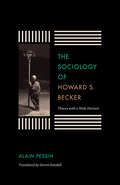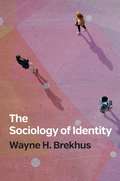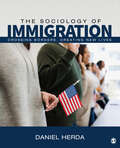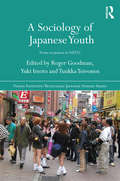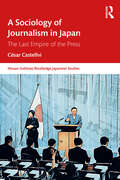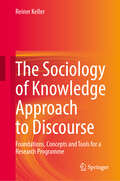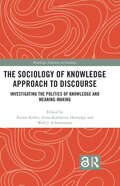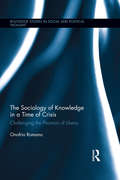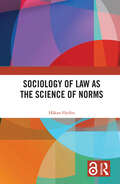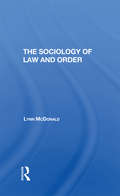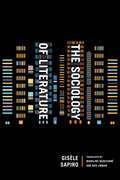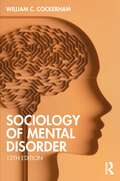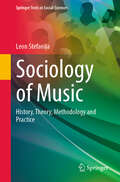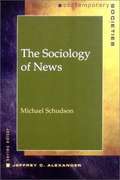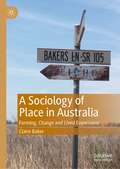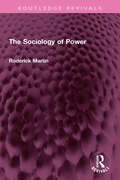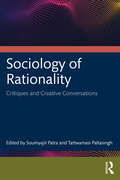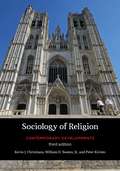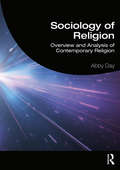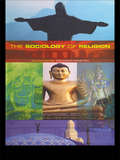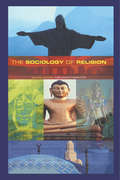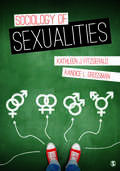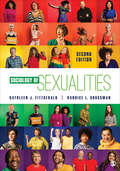- Table View
- List View
The Sociology of Howard S. Becker: Theory with a Wide Horizon
by Alain Pessin Steven RendallHoward S. Becker is a name to conjure with on two continents —in the United States and in France. He has enjoyed renown in France for his work in sociology, which in the United States goes back more than fifty years to pathbreaking studies of deviance, professions, sociology of the arts, and a steady stream of books and articles on method. Becker, who lives part of the year in Paris, is by now part of the French intellectual scene, a street-smart jazz pianist and sociologist who offers an answer to the stifling structuralism of Pierre Bourdieu. French fame has brought French analysis, including The Sociology of Howard S. Becker, written by Alain Pessin and translated into English by Steven Rendall. The book is an exploration of Becker’s major works as expressions of the freedom of possibility within a world of collaborators. Pessin reads Becker’s work as descriptions and ideas that show how society can embody the possibilities of change, of doing things differently, of taking advantage of opportunities for free action. The book is itself a kind of collaboration—Pessin and Becker in dialogue. The Sociology of Howard S. Becker is a meeting of two cultures via two great sociological minds in conversation.
The Sociology of Identity: Authenticity, Multidimensionality, and Mobility
by Wayne H. BrekhusHow do people think about their identities? How do they express themselves individually and as part of collective groups, social movements, organizations, neighborhoods, or nations? Identity has important consequences for how we organize our lives, wield social power, and produce and reproduce privilege and marginality. In this lively and engaging book, Wayne H. Brekhus explores the sociology of identity and its social consequences through three conceptual themes: authenticity, multidimensionality, and mobility. Drawing on vivid examples from ethnography, current events, and everyday life, he offers an approach to identity that goes beyond the individual and demonstrates how social groups privilege, flag, and shape identities. Offering an insightful overview of the sociological approaches to understanding social identity in a multicultural, globalized world, The Sociology of Identity will be a welcome resource for students and scholars of identity, and anyone interested in the social and cultural character of the self.
The Sociology of Immigration: Crossing Borders, Creating New Lives
by Daniel HerdaThe Sociology of Immigration provides students with a contemporary sociological perspective on the entire immigration process: deciding to leave one’s home country, establishing oneself in a new host society, being received by the host population, and deciding whether to assimilate or seek citizenship. Using historical and contemporary examples, it applies many foundational concepts in sociology, such as culture, socialization, race and ethnicity, gender, and the sociological imagination, to the phenomenon of human migration. The text introduces immigration and migration on a global scale, but also emphasizes immigration in a U.S. context.
The Sociology of Immigration: Crossing Borders, Creating New Lives
by Daniel HerdaThe Sociology of Immigration provides students with a contemporary sociological perspective on the entire immigration process: deciding to leave one’s home country, establishing oneself in a new host society, being received by the host population, and deciding whether to assimilate or seek citizenship. Using historical and contemporary examples, it applies many foundational concepts in sociology, such as culture, socialization, race and ethnicity, gender, and the sociological imagination, to the phenomenon of human migration. The text introduces immigration and migration on a global scale, but also emphasizes immigration in a U.S. context.
A Sociology of Japanese Youth: From Returnees to NEETs (Nissan Institute/Routledge Japanese Studies)
by Roger Goodman Yuki Imoto Tuukka ToivonenOver the past thirty years, whilst Japan has produced a diverse set of youth cultures which have had a major impact on popular culture across the globe, it has also developed a succession of youth problems which have led to major concerns within the country itself. Drawing on detailed empirical fieldwork, the authors of this volume set these issues in a clearly articulated ‘social constructionist’ framework, and put forth a sociology of Japanese youth problems which argues that there is a certain predictability about the way in which these problems are discovered, defined and dealt with. The chapters include case studies covering issues such as: Returnee children (kikokushijo) Compensated dating (enjo kōsai) Corporal punishment (taibatsu) Bullying (ijime) Child abuse (jidō gyakutai) The withdrawn youth (hikikomori) and NEETs (not in education, employment or training) By examining these various social problems collectively, A Sociology of Japanese Youth explains why particular youth problems appeared when they did and what lessons they can provide for the study of youth problems in other societies. This book will be of huge interest to students and scholars of Japanese society and culture, the sociology of Japan, Japanese anthropology and the comparative sociology of youth studies.
A Sociology of Journalism in Japan: The Last Empire of the Press (ISSN)
by César CastellviThis book represents an in-depth analysis of journalism in Japan during the golden era of the daily press and the gradual introduction of digital technology starting from the mid-1980s to the late 2010s.By presenting firsthand testimony from journalists and field notes collected from fieldwork in the newsroom of one of the country's largest newspapers, this book provides a unique insight into Japan’s highly active yet relatively under-institutionalized journalistic profession. It also explores the changes experienced by the organizational development of Japanese journalism in response to broader changes in Japanese society, such as the emergence of social networks, the evolution of reading practices, the demographic situation, and the new aspirations of the Japanese youth.Based on an extensive ethnographic fieldwork carried out by the author over several years, this book will be of huge interest to students and scholars of Japanese society, journalism, and media studies.
The Sociology of Knowledge Approach to Discourse: Foundations, Concepts and Tools for a Research Programme
by Reiner KellerIn this updated version of a contemporary classic of discourse research, Reiner Keller develops the theoretical and methodological foundations of the Sociology of Knowledge Approach to Discourse (SKAD). Translated from the original German into English for the first time, this book brings together two previously unconnected domains of knowledge analysis in social science: the rich traditions of sociology of knowledge and symbolic interactionism on one hand and the works of discourse studies, especially in relation to Michel Foucault, on the other. It presents a critical discussion of key developments in sociology of knowledge, symbolic interactionist, and related interpretive approaches, explains the communicational turn of recent work in the field, and examines how traditions within sociology of knowledge shifted focus or converged over time. Following this, the book discusses the development of discourse theory and discourse analysis since the 1960s, including critical discourse analysis, hegemony analysis, or cultural studies approaches. Embarking from a profound reconstruction of Michel Foucault’s work, the book then sets its own distinctive course by integrating major elements of Foucault’s perspective with the sociology of knowledge. Along this path, Reiner Keller establishes the heuristics and methodology for a sociology of knowledge approach to discourse, providing a comprehensive research programme for the study of social relations of knowledge and politics of knowledge. Since its first publication in 2005, SKAD has informed a multitude of studies worldwide and across several academic disciplines. Today it can be considered as one of the major perspectives in discourse research in social science and beyond.
The Sociology of Knowledge Approach to Discourse: Investigating the Politics of Knowledge and Meaning-making. (Routledge Advances in Sociology)
by Reiner Keller Anna-Katharina Hornidge Wolf J SchünemannThe Sociology of Knowledge Approach to Discourse (SKAD) has reoriented research into social forms, structuration and processes of meaning construction and reality formation; doing so by linking social constructivist and pragmatist approaches with post-structuralist thinking in order to study discourses and create epistemological space for analysing processes of world-making in culturally diverse environments. SKAD is anchored in interpretive traditions of inquiry and allows for broadening – and possibly overcoming – of the epistemological biases and restrictions still common in theories and approaches of Western- and Northern-centric social sciences. An innovative volume, this book is exactly attentive to these empirically based, globally diverse further developments of approach, with a clear focus on the methodology and its implementation. Thus, The Sociology of Knowledge Approach to Discourse presents itself as a research program and locates the approach within the context of interpretive social sciences, followed by eleven chapters on different cases from around the world that highlight certain theoretical questions and methodological challenges. Presenting outstanding applications of the Sociology of Knowledge Approach to Discourse across a wide variety of substantive projects and regional contexts, this text will appeal to postgraduate students and researchers interested in fields such as Discourse Studies, Sociology, Cultural Studies and Qualitative Methodology and Methods.
The Sociology of Knowledge in a Time of Crisis: Challenging the Phantom of Liberty (Routledge Studies in Social and Political Thought #92)
by Onofrio RomanoThe speed of social dynamics has overtaken the speed of thought. Adopting a dialectical perspective towards reality, social theory has always detected faults in the dominant social pattern, foreseeing crises and outlining in advance the features of new social models. Thought has always moved faster than reality and its ruling models, ensuring a dynamic equilibrium during modernity. Despite any dramatic social crisis, theory has always provided exit routes. The tragedy of current crisis lies in the fact that its social implications are exasperated by the absence of alternative views. This book identifies the causes of this mismatch between thought and reality, and illustrates a way out.
Sociology of Law as the Science of Norms (Studies in the Sociology of Law)
by Håkan HydénThis book proposes the study of norms as a method of explaining human choice and behaviour by introducing a new scientific perspective. The science of norms may here be broadly understood as a social science which includes elements from both the behavioural and legal sciences. It is given that a science of norms is not normative in the sense of prescribing what is right or wrong in various situations. Compared with legal science, sociology of law has an interest in the operational side of legal rules and regulation. This book develops a synthesizing social science approach to better understand societal development in the wake of the increasingly significant digital technology. The underlying idea is that norms as expectations today are not primarily related to social expectations emanating from human interactions but come from systems that mankind has created for fulfilling its needs. Today the economy, via the market, and technology via digitization, generate stronger and more frequent expectations than the social system. By expanding the sociological understanding of norms, the book makes comparisons between different parts of society possible and creates a more holistic understanding of contemporary society. The book will be of interest to academics and researchers in the areas of sociology of law, legal theory, philosophy of law, sociology and social psychology.
Sociology Of Law & Order/h
by Lynn McdonaldThis book is about the law and order issue, and the role social scientists have played in legitimating it as a problem of grave social consequences. It is a study on rising crime rates and criminal behaviour within the limits of conventional social science, with its advantages and disadvantages.
The Sociology of Literature
by Gisèle SapiroThe Sociology of Literature is a pithy primer on the history, affordances, and potential futures of this growing field of study, which finds its origins in the French Enlightenment, and its most salient expression as a sociological pursuit in the work of Pierre Bourdieu. Addressing the epistemological premises of the field at present, the book also refutes the common criticism that the sociology of literature does not take the text to be the central object of study. From this rebuttal, Gisèle Sapiro, the field's leading theorist, is able to demonstrate convincingly one of the greatest affordances of the discipline: its in-built methods for accounting for the roles and behaviors of agents and institutions (publishing houses, prize committees, etc.) in the circulation and reception of texts. While Sapiro emphasizes the rich interdisciplinary nature of the approach on display, articulating the way in which it draws on literary history, sociology, postcolonial studies, book history, gender studies, and media studies, among others, the book also stands as a defense of the sociology of literature as a discipline in its own right.
Sociology of Mental Disorder
by William C. CockerhamThe twelfth edition of the Sociology of Mental Disorder presents the major issues and research findings on the influence of race, social class, gender, and age on the incidence and prevalence of mental disorders. The text also examines the institutions that help those with mental disorders, mental health law, and public policy. Many important updates are new to this edition: The mental health effects of the COVID-19 pandemic are examined. Aging and mental health is discussed in more detail. Updated review of gender differences in mental disorder. A revised and more in-depth discussion of mental health and race. Problems in the community care of the mentally ill are covered. Updates of research and citations throughout. Blending foundational concepts and sociological perspectives on mental health issues with newer studies and accounts in an accessible and authoritative survey of the field, the new edition of Sociology of Mental Disorder remains an essential text and an invaluable resource for students and scholars.
Sociology of Music: History, Theory, Methodology and Practice (Springer Texts in Social Sciences)
by Leon StefanijaThe textbook provides students with insight into and overview of the basics of social research on music. It addresses the Who, What, When, Where, Why, How of music research through four perspectives from the sociological study of music: a historical survey of the social study of music (when), theoretical points of view (what), and methodological (how), and pragmatic aspects (who, why & how). The other Ws (where and why) are included within the four main perspectives. The four perspectives – history, theory, methodology, and practice – are complementary. Some of the names included in the theory and practice of music are also listed as a part of the history of music sociology, and vice versa. In this way, the book encompasses what Howard S. Becker has conceptualized as an art world, Kurt Blaukopf as musical practice, and Christopher Small as musicking. Covering all the relevant details yet concise in structure, this book is ideal for students of the sociology of music, musical education, musicology and of arts and aethestics.
The Sociology of News
by Michael SchudsonThe Sociology of News offers a brief, but comprehensive account of the origins, structures, operating practices, codes, and cultures of the contemporary news media, analyzing the question of the consequences of news on society--and politics.
A Sociology of Place in Australia: Farming, Change and Lived Experience
by Claire BakerThis book weaves a social, economic and cultural history of Australia with rare first-hand accounts of the lived experience of change related to farming and agriculture. It provides a rich sociology of how living on the land has changed throughout Australia’s history. The book investigates the complex effects of the state on everyday life, using an historical agricultural case study of place to explore long-running sociohistorical processes of change examined through both a macro and micro sociological lens. This provides a multi-faceted perspective from which to examine economic, social and cultural transformations in each of these contexts and change is examined through multiple sites of expression: public policy and the role of the state; colonial processes of dispossession; social and cultural systems of value; economic change and its consequences; farming practices and lived experience; neoliberalism and globalisation and their social impacts; community decline and trends toward corporate and foreign land ownership. Each of these transformations impact upon lived experience and everyday life and this book provides grounded insight into exactly this relationship and process.
The Sociology of Power (Routledge Revivals)
by Roderick MartinFirst published in 1977, The Sociology of Power presents a broad comparative study in the sociology of domination by placing empirical research in political and industrial sociology in a comprehensive theoretical framework, derived from Marxism and social exchange theory. Roderick Martin argues that conventional definitions of ‘political sociology’ are no longer relevant, having been replaced by a revival of interest in wider problems, which need to be approached from new theoretical positions. He contends that what is needed is a more general definition, based on the analytical concepts of sociological theory. Three initial general chapters locate the study within the social action tradition and discuss problems of definition and measurement in detail. The major part of the book examines the distribution of power under different systems of labour exploitation-slavery, feudalism and especially capitalism. Professor Martin sees power as most concentrated in slavery, most dispersed in capitalism, and shows the extent and importance of this dispersal by a detailed discussion of power relations within industrial and political organizations, including trade unions and a critique of contemporary elitist theories. By reorienting political sociology around the concept of power and by analyzing the conventionally distinct fields of industrial and political sociology within a common theoretical framework, Roderick Martin offers a persuasive redefinition of the sociology of politics. This is a must read for scholars and researchers of sociology.
Sociology of Rationality: Critiques and Creative Conversations
by Soumyajit Patra Tattwamasi PaltasinghThis book is a socio-historical analysis of rationalism as a world view – that guides many of our actions in concrete everyday life – and as a philosophy – that guides our epistemological understanding of the reality around us. It explores the multifaceted manifestations of the idea in the Enlightenment philosophy, modern sociological theorising and post-structural standpoints. The volume also critiques rationality from feminist, subaltern and postcolonial perspectives. Finally, it delves into the multi-layered sociological significances of rationalisation of different domains of life. Transdisciplinary in scope and with essays by foremost scholars in the field, this volume will be a major intervention across the humanities and the social sciences. It will be of interest to students and researchers in sociology, anthropology, history, philosophy, gender studies, political science, cultural anthropology, education, and religious studies.
Sociology of Religion: Contemporary Developments
by Kevin Christiano Peter Kivisto William H. Jr. SwatosThis third edition of Sociology of Religion introduces students to key principles in the sociological understanding of religion, with revisions and updates throughout. The book offers an overview of the nature and function of religious institutions and practices, asking sociological questions about the changing role of religion in today’s “post-traditional” world.
Sociology of Religion: Overview and Analysis of Contemporary Religion (Theology And Religion In Interdisciplinary Perspective Series In Association With The Bsa Sociology Of Religion Study Group Ser.)
by Abby DayThe first sociology of religion textbook to begin the task of diversifying and decolonizing the study of religion, Sociology of Religion develops a sociological frame that draws together the personal, political and public, showing how religion – its origins, development and changes – is understood as a social institution, influenced by and influencing wider social structures. Organized along sociological structures and themes, the book works with examples from a variety of religious traditions and regions rather than focusing in depth on a selection, and foregrounds cultural practice-based understandings of religion. It is therefore a book about ‘religion’, not ‘religions’, that explores the relationship of religion with gender and sexuality, crime and violence, generations, politics and media, ‘race’, ethnicity and social class, disease and disability – highlighting the position of religion in social justice and equality. Each chapter of this book is framed around concrete case studies from a variety of Western and non-Western religious traditions. Students will benefit from thinking about the discipline across a range of geographical and religious contexts. The book includes features designed to engage and inspire students: Up-to-date and comprehensive analysis of engaging and accessible material ‘Case Examples’: short summaries of empirical examples relating to the chapter themes Visually distinct boxes with bullet points, key words and phrases focusing on the context Questions suitable for private or seminar study Suggested class exercises for instructors to use Suggested readings and further readings/online resources at the end of each chapter Following a review and critique of early sociology of religion, the book engages with more contemporary issues, such as dissolving the secular/sacred binary and paying close attention to issues of epistemology, negotiations, marginalities, feminisms, identities, power, nuances, globalization, (post) (multiple) modernity (ies), emotion, structuration, reflexivity, intersectionality and urbanization. This book is essential reading for undergraduate and postgraduate students exploring the sociology of religion, religion and society, religious studies, theology, globalization and human geography.
The Sociology of Religion: An Introduction to Theoretical and Comparative Perspectives
by Malcolm B. HamiltonThe Sociology of Religion is a comprehensive and wide-ranging introduction to theoretical debates in the sociology of religion, placing these theories in the context of specific religious beliefs and practices. Using examples as diverse as primitive religions, Buddhism, millenial movements, the Protestant Ethic, secularisation, cults and the new religious movements, Malcolm Hamilton demonstrates the multiplicity of religious traditions and enables readers to place their own experiences in a wider context. He draws on both historical and anthropological perspectives in his examination of religious practices and outlines the work of major sociological theorists including Marx, Durkheim, Malinowski and other Functionalists, Frazer and Weber in the examination of world religion, bringing these theories up-to-date. The significance of each theoretical perspective is illustrated by chapters on particular beliefs and practices.
The Sociology of Religion: Theoretical and Comparative Perspectives
by Malcolm B. HamiltonThis clear introduction to the sociology of religion combines a discussion of key theorists with a modern emphasis on the diversity of religious beliefs and practices. Malcolm Hamilton's expanded second edition brings the discussion fully up-to-date, and extends its material on secularization and religious sects, giving a broad comparative view. Drawing on the insights of history, anthropology and sociology, he surveys classic and contemporary theory to give a full picture of the variety and scope of theoretical perspectives.
Sociology of Sexualities
by Kathleen J. Fitzgerald Kandice L. GrossmanSociology of Sexualities by Kathleen J. Fitzgerald and Kandice L. Grossman is the first comprehensive text to approach the study of sexuality from a sociological perspective. Drawing on the most up-to-date social scientific research on sexuality, it discusses fundamental concepts in the field and helps students integrate knowledge about sexuality into their larger understanding of society. Topics covered include the emergence of sexual identities, inequalities and discrimination faced by sexual and gender minorities, heterosexual and cisgender privilege, activism and mobilization to challenge such discrimination, the commodification of sexuality, and the ways sexuality operates in and through various institutions. Throughout the text, the authors show how sexuality intersects with other statuses and identities.
Sociology of Sexualities
by Kathleen J. Fitzgerald Kandice L. GrossmanSociology of Sexualities by Kathleen J. Fitzgerald and Kandice L. Grossman is the first comprehensive text to approach the study of sexuality from a sociological perspective. Drawing on the most up-to-date social scientific research on sexuality, it discusses fundamental concepts in the field and helps students integrate knowledge about sexuality into their larger understanding of society. Topics covered include the emergence of sexual identities, inequalities and discrimination faced by sexual and gender minorities, heterosexual and cisgender privilege, activism and mobilization to challenge such discrimination, the commodification of sexuality, and the ways sexuality operates in and through various institutions. Throughout the text, the authors show how sexuality intersects with other statuses and identities.
Sociology of Sexualities
by Kathleen J. Fitzgerald Kandice L. GrossmanSociology of Sexualities takes a unique sociological approach to the study of sexualities and explores the ways sexuality operates in and through institutions. Drawing on the most up-to-date scientific research on sexuality, as well as the latest political developments on the issues, this core text helps readers connect knowledge about sexuality with their broader understanding of society. The thoroughly revised Second Edition includes updated and expanded discussions of the latest sociological research and social justice movements regarding gender and sexuality, as well as a new chapter exploring sexuality and social class, space, and place.
